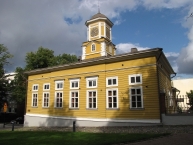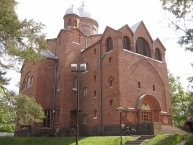EuroVelo: Ostseeküstenradweg Finnland
Nr. des Radweges EV10
Aktionen
![]()
Bitte warten - Kartendaten werden geladen
Erstellt am 12.07.2012,
am 29.03.2024
Aktionen
Strecken-Merkmale
Gesamtlänge in km
1.754
Informationen zu Rechten an den GPS-Track-Daten | |
|---|---|
Rechte-Inhaber | OpenStreetMap and Contributors + biroto-Redaktion (biroto.eu) |
Rechte-Ausprägung / Lizenz | Enthält Daten von OpenStreetMap, die hier unter der Open Database License(ODbL) verfügbar gemacht werden |
Link zur Rechtebeschreibung | |
gpx-Datei übernommen aus | |
gpx-Datei hochgeladen | durch biroto-Redaktion am 29.03.2024
|
Gesamtzahl Trackpoints
27.580
Trackpoint-Dichte per km
16
Endorte
Start
Lappeenranta, FI (48 m NHN)
Ziel
Tornio, FI (5 m NHN)
Charakter
From the Russian border to Pori the cycleway follows the national route 7 (border to Helsinki), 1 (Helsinki to Turku) and 8 (Turku to Oulu), from Oulu to Keminmaa via national route 4, and from there to the Swedish border via national route 21.
Informationen zu Urheber-Rechten | |
|---|---|
Rechte-Ausprägung / Lizenz | by-sa: CREATIVE COMMONS Namensnennung, Weitergabe unter gleichen Bedingungen |
Link zur Rechtebeschreibung | |
übernommen / bearbeitet am | 20.07.2012 - 30.08.2012
|
übernommen / bearbeitet durch |
|
Anschluss-Radwege
- in Tornio EV10 Ostseeküstenradweg Schweden
Bemerkungen
Die Route ist Teil der EuroVelo Route 10 "Ostseeküstenradweg".
Fahrradfreundliche Unterkünfte, Sehenswertes und Infrastruktur
Name u. Anschrift
Breite / Länge
Tel.
Fax.
Mobile
Art d. Unterkunft
Radler-freund-lichkeit
Strecken-km
km zur Strecke
Höhe
1 km
0,7 km
46 m
Öffnungszeiten
24 hours open
8 km
0,2 km
33 m
30 km
1,6 km
102 m



Lappeenranta (Swedish: Villmanstrand) is a city and municipality situated on the shore of the lake Saimaa in South-Eastern Finland, about 30 kilometres (19 miles) from the Russian border. It belongs to the region of South Karelia. With approximately 73,000 inhabitants (31 March 2016) Lappeenranta is the 13th largest city in Finland. The neighboring municipality of Joutseno
was consolidated with Lappeenranta on January 1, 2009, and the neighboring municipality of Ylämaa
on January 1, 2010. Lappeenranta is known as an international university city in Finland with Lappeenranta University of Technology and Saimaa University of Applied Sciences which together have approximately 13,000 students from 68 countries. Lappeenranta is also a commercial centre of South-East Finland and the meeting point of the EU and Russia, 215 km from both Helsinki and St. Petersburg. Location on the southern shore of Lake Saimaa makes the city the region’s centre for tourism. Lappeenranta is second most visited city by Russian tourists in Finland after Helsinki and it competes with Helsinki for the largest share of tax-free sales in Finland.
Lappeenranta was originally formed around a headland pointing to lake Saimaa. In the 16th century, the market place moved from Lappee's old centre Kauskila to the current fortress headland. The first mention of Lapwes, as it was called, is in a privilege charter from 1542 that subjugated the market place under Viborg's authority.
The town was chartered in 1649 by Queen Christina of Sweden, legitimizing the trade in the then popular marketplace of Lapvesi. However, the parliamentary privilege charter and the coat of arms were attested in 1652 after the town layout by Erik Aspegren was affirmed. At the time, Lappeenranta was an important port for tar.
Between 1721 and 1743, Lappeenranta was the capital of Kymmenegård and Savonlinna province.
In 1741, the battle of Villmanstrand was fought between the Swedish and Russian armies in the Russo-Swedish War of 1741–1743. The battle ended in a Russian victory. The town was pillaged, wooden structures including the provincial chancellery were burnt and the ecclesiastical archives damaged.
The municipalities of Lappee and Lauritsala were annexed to Lappeenranta in 1967. Nuijamaa joined in 1989. During the financial downturn of 2009 and 2010, Joutseno and Ylämaa
respectively merged into Lappeenranta.
Lappeenranta is known as a summer city, mostly due to its closeness to the Lake Saimaa . Europe’s 4th largest lake. The eponymous GoSaimaa (www.gosaimaa.com) provides all the touristic activities in the area. In addition, its inland location means that summers tend to be warmer and winters colder than along the coastal areas.
Lappeenranta does have a healthy winter tourism industry. Various cabins around Lake Saimaa, as well as numerous snowmobiles, Nordic skating, floating in the river, reindeer rides, paragliding, skiing and sledding tracks draw a fair number of winter visitors.
The proximity of the Russian border is increasingly visible in the number of Russian tourists visiting the city. In fact, Lappeenranta is closer (195 km or 121 miles) to Saint Petersburg than Helsinki, the capital of Finland (220 km or 140 miles). The presence of Russian tourists is noticeable by the many Russian registered cars on the streets and the use of Cyrillic letters in signs of some shops.
Places and events
- The old fortress, with a number of museums, cafés and the oldest Russian Orthodox church in Finland.
- St. Mary's Church of Lappee
, an 18th-century wooden church in the center of the city.
- The harbour area, with cruises to Vyborg
and the nearby Saimaa Canal
.
- The central market place, where you can enjoy the local specialities, such as meat pies known as "Atomi" (atom) or "Vety" (hydrogen).
- The Night of The Fortess, a two-day cultural festival held in early August.
- The Lappeenranta Ballet Gala in late August.
- The annual Lappeenranta National Singing Contest.
- The biggest sand castle in Finland is built next to Port of Lappeenranta every summer.
Informationen zu Urheber-Rechten | |
|---|---|
Rechte-Ausprägung / Lizenz | by-sa: CREATIVE COMMONS Namensnennung, Weitergabe unter gleichen Bedingungen |
Link zur Rechtebeschreibung | |
Text(e) übernommen von: |
Lappeenranta. (2017, February 12). In Wikipedia, The Free Encyclopedia. Retrieved 17:15, February 16, 2017, from https://en.wikipedia.org/w/index.php?title=Lappeenranta&oldid=765153375 |
übernommen / bearbeitet am | 16.02.2017
|
übernommen / bearbeitet durch |
|
31 km
1,5 km
101 m
31 km
0,4 km
90 m
![]()
